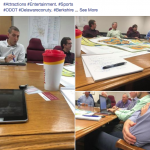Greener Grass
A funny thing happened to Ron Horsley on the way to becoming a children’s author: in the process of creating his book, Beyond the Grass Ocean,—designed to help children deal with the realities of loss—he realized he hadn’t been very adept at dealing with it himself.
Years in the making, his vivid, realistic vessel now doubles as a document of self-actualization, an accomplishment of both professional and personal growth.
Beset by losses in his own life, and gripped with his own psychological evolution, the end-result for Horsley has been cathartic, revealing—perhaps a more intense after-effect than your average kid-lit project.
“There are plenty of books for children and young readers to try and address death,” the Columbus artist said. “But they tend to either try and soften it, fall into the routine of some religious or spiritual explanations and assurances, or hide our adult discomfort and ignorance behind clinical jargon and technical terms the way sex-ed is often taught.”
Just ahead of its debut at the Ohioana Book Festival this month, Horsley sat down with (614) to go beyond the ink.
What do you categorize as a “worldly” child?
A “worldly” child is one who is willing to truly seek out the greater world beyond just what they know within the four walls of their bedroom or the perimeter of their backyard. And I don’t mean they have to necessarily physically leave those places…but be open and curious about the entire realms of experience and interaction that are possible even within those smaller worlds.
Do you feel like this book intends to take some of the sappiness and condescension out of children’s lit? Ostensibly to speak to children in a way that engages their whimsical imagination, but also connects to them on a real, psychological level?
Absolutely…though not all children’s literature is condescending. I was inspired by those examples like J.K. Rowling who really took care not to condescend or treat their readers as idiots or “utter innocents” with fragile minds.
In fact, I kept feeling frustrated in the writing of it that I wasn’t being “simple” enough, or spelling things out at a Dora the Explorer level of slow generalizations. I had to stop and realize that when I felt like that it was because I was already making assumptions about the youngest potential readers, about what I was condescending to think of as their ‘low’ comprehension or attention spans. But I believe that every generation of child wants to be engaged and their imagination piqued, so I stuck to that as my primary guide.
I felt like there needed to be a story told in a more modern fantastical vein that reached to kids without hiding behind jargon or trying to sell them some particular wish of an afterlife or justification for everything. I don’t offer absolute answers, just try to give them a way of comprehending that some things are not about answers and more about arriving at a state of acceptance, of questioning but also dealing with rather than avoiding the harsher aspects of life and death. I want people to realize that they don’t have to find some grand explanation for a given reality to be able to deal with the very real day-to-day consequences of its presence.
What influences the artwork? As someone who’s never created a lush world from scratch, what are the main challenges?
Jules Feiffer’s drawings for The Phantom Tollbooth. Joseph Schindelman’s spiky cross hatched Willy Wonka and Charlie Bucket. John Tenniel’s astounding Victorian work for the Alice books. Eric Shanower and John R. Neill’s work on the Oz universe. Certainly Winsor McKay’s Little Nemo in Slumberland drawings and the surrealist work of Rene Magritte. Outside of traditional visual art, I was inspired by the music of Thomas Dolby, Tom Waits, and The Pixies.
Are these settings and scenes you’ve seen in your imagination? Dreams? Or are they pastiches of reality and the colorful world of illustration in your own experience?
The generic answer is yes and yes and yes. More specifically, I was inspired from films as a child: the Robin Williams’ fantasy Toys, Terry Gilliam’s epics like The Adventures of Baron Munchausen. The paintings of Edward Hopper, comic books like The Crow and Moonshadow, and Bernie Wrightson’s astounding Illustrated Frankenstein. The world of the Great Grass Ocean is one that’s been budding in the back of my head and peeking out in occasional dreams since my teen years. It’s my mental ‘go away’ space, so finally sitting down to write a story set there was just deciding whose story to tell, and letting it forge its own path with my writing it down. I always liked the semi-mad way that Baum insisted that the Land of Oz was real, and he was just its Royal Historian here in the everyday world writing down its adventures for children by way of Morse telegraph in the Emerald City.
In your blog, you say the book “would let children and adults bridge the communication gap between them to try and better understand such experiences.” Why is that important to you? What inspired that as a goal of this project?
It’s important to me because I truly believe that every generation, no matter what its technological or cultural variations, is essentially still the same humanity its been for millennia so resolving a lot of the problems we keep having has to start with acknowledging that essential truth. So when people talk about ‘these kids’ or get disgusted with ‘this unaffected and detached and apathetic’ new generation, I keep thinking “But…we raised them. Aren’t they a product of what WE turned them into or let them become in absence of anything more instructive?” And the issues that I try to touch upon in the book are perhaps the biggest mysteries or obstacles that people have to deal with pretty much their entire lives. It seemed to me that the stories we tell children need to be the same stories that we as adults would take some comfort in as a way to start realizing that.
Ultimately, what is the big takeaway from your experience with BTGO?
I found I had been so self-assured that I ‘knew’ these lessons and ideas so well to write a book expressing them to children, I had lost sight of a good deal of those same lessons. It wasn’t entirely a pleasant experience, but it sharpened my determination for what I’m trying to do with this work, and convinced me that everybody of any age needs the occasional escape that helps them process the tougher facts of life.
For more, visit beyondthegrassocean.com
BROUGHT TO YOU BY





